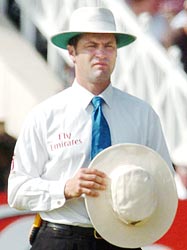Home > Cricket > Interview
The Rediff Cricket Interview
/ Simon Taufel
Umpires get most decisions right: Taufel
October 04, 2004
Simon Taufel, the International Cricket Council's 'Umpire of the Year', isn't one to mince words. If he has something to say, he will say it.
 The ICC has of late tried a number of experiments, especially when it comes to the decision-making process for umpires. But while Taufel believes that technology can help to minimise errors, he also believes that too much technology will erode the skills of the umpire and change the face of cricket.
The ICC has of late tried a number of experiments, especially when it comes to the decision-making process for umpires. But while Taufel believes that technology can help to minimise errors, he also believes that too much technology will erode the skills of the umpire and change the face of cricket.
The world's best umpire spoke to Senior Correspondent Ashish Magotra. Excerpts:
The ICC tried a number of experiments on the technological front during the Champions Trophy. What was your final reading?
The ICC tried two main things during the tournament. One was the two-way earpiece that allowed us to hear noise from the stump microphone. It was a big plus, particularly in noisy games and in games like India v Pakistan. Without that, the umpires would have made a few mistakes, I am sure.
The communication tools were also great and allowed us to communicate with our on-field colleagues and the third umpire a lot more efficiently.
The other [innovation] was the front-foot no-ball rule was called by the third umpire. At venues where we had earpiece technology, that worked okay. Other venues that just use two-way radios, that was quite poor.
So far as umpiring is concerned on the front-foot no-ball experiment, I think a majority of us would still watch the front foot in order to get an idea of where the ball is being delivered from, and still use that in the process of judging leg-before decisions. But there was a benefit in my mind of not having to dwell on the front foot for long and being able to concentrate on the business end.
We still had a hole in the system where no one was watching the back foot. Because the cameras were not covering the back foot. So that was an issue. There were some pluses and there were a few minuses, and I think it was good to try out a few more things.
What is your technology wish-list right now?
Personally, I would only like technology to be introduced if umpiring is not what it used to be. If I look at the two hardest decisions in the game, they are most probably the caught-behinds down the leg-side and the bat-pad decisions. As an umpire, those are probably the most difficult to judge. Leg-before decisions are, to my mind, the easiest to judge. Because,
theoretically, you are the only one in the park who knows whether the batsman is out or not. We have used technology, but that has proved to be inconclusive.
So what are we really looking at? Is the game changing for the better or the worse?
That then becomes a philosophical question, knowing that we are not going to achieve a 100 per cent accuracy rate. Do we want to change the game for an extra couple of decisions that might prove beneficial? Do we want to increase the cost of the game? The broadcasters are not going to provide all the technology free.
What kind of skill levels are we talking about for an international umpire?
Well, I have gone on record earlier and said that the further an umpire goes in international cricket, the more deskilled he becomes. The more his skills are not tested. I would like to have my skills tested. You know, the players' skills get tested in the match. Why not the officials? We do make mistakes, but statistics have shown that we make more correct decisions than mistakes.